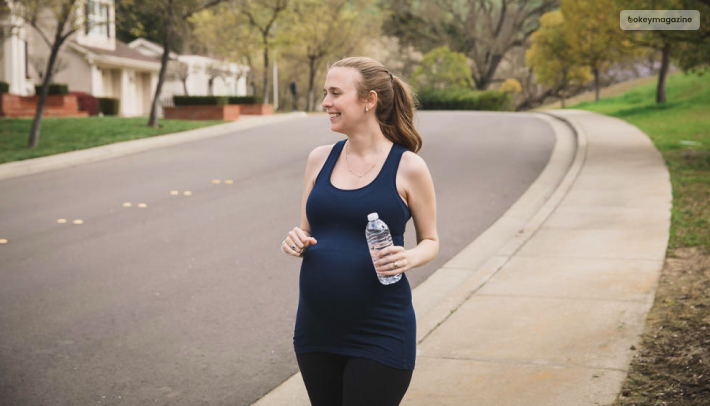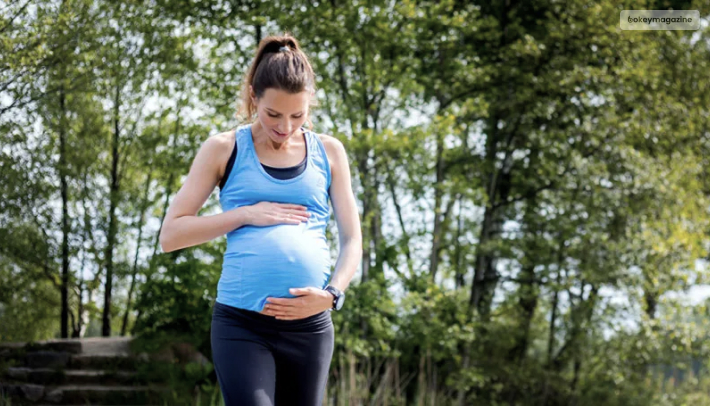
Running While Pregnant: Is It Ok To Run While Pregnant?
Exercising brings a number of benefits to our bodies. Running marks a high-intensity exercise that keeps our blood circulation level normal. But is it okay to opt for running while pregnant? A lot of expecting mothers ask me this! So, let’s delve deeper into the comprehensive guide and discover the answer.
For a pregnant lady, it is generally suggested to indulge in a moderate-intensity workout for at least 150 minutes. But that’s when you have a normal and healthy pregnancy. Doctors are of the opinion that women who have a habit of running prior to the pregnancy might continue it later as well.
How Safe Is Running While Pregnant?

Generally speaking, running is safe while pregnancy, provided you have a normal one. A lot of suggestions to not run might come from family and well-meaning friends. Some might even warn you that the intensive level might induce early labor and further complications in the pregnancy.
If you are consistently fed these fears, it’s time to break free from the confusion. While the concern generally comes from your safe haven, you might need to analyze things a bit from your side, too. Running never caused a miscarriage or damage to the baby in the past. If you were running before you started expecting, you might continue it now as well.
That being said, you might want to consult your physician before taking the step. To make things a bit easier for you, I will cover the benefits and risks of running while pregnant in the next section of the article.
Unraveling Pregnancy Running Benefits

No other journey is as beautiful as pregnancy. A mother rediscovers herself during these 9 months. But that doesn’t mean it is easy to be an expecting mother. One cannot even imagine what goes on with the body when embarking on pregnancy. There is fatigue, mood swings, weight gain, and pregnancy brain fog waiting to hit you up.
Yet, keeping yourself active during pregnancy can immensely improve the way you feel mentally and physically. The 150-minute workout I talked about earlier can induce sweating along with raising your heart rate.
In case you were physically active prior to pregnancy, remaining active has no serious implications. All you have to do is adjust the workout intensities accordingly now that you know you have a life growing inside you! Running while pregnant eases back pain, fatigue, and constipation.
Let’s not forget that exercise boosts the endorphin production in our body. These refer to the good hormones that eventually lighten our mood. Running and exercising while pregnant is a win-win as it keeps your mental and physical well-being active.
Tips To Have A Safe Running While Pregnant

While running is absolutely fine for expecting mothers, there might be a few things that you must keep in mind.
Get Bonny Sneakers
While pregnancy, the joints in your feet and ankles are prone to injuries. So, if you are not wearing a good pair of shoes, you might experience a fall. Opt for supportive running shoes, one that gives your feet relief even while doing this strenuous exercise. Chances are your feet get a bit swollen at this time, so opt for a bigger size.
Support Your Breasts As Well
It is no longer a hidden fact that a woman’s breast undergoes various changes during this period. The variation in sizes might cause trouble in exercising. So, if you are running while pregnant, get yourself a good, supportive bra and avoid breast pain, at least!
Hydrate Yourself Well
The increased bladder pressure has already made it difficult for you to take frequent toilet breaks. While it might sound a bit tempting to consume more water, it is quite necessary. An expecting mother might need 8-12 cups of water a day. Water increases the amniotic fluid in the body.
Further, higher blood volume removes waste and makes digestion better.
Consider Your Body Needs
Testing your personal best isn’t a much-suited activity during pregnancy. Your body might be working too hard already. So, if you think you cannot afford to run, just don’t do it. Running while pregnant is not mandated; instead, opt for slow walk breaks and yoga practices. During these trying times, don’t forget to hear your body out.
Be Wary Of When To Put An End
The firstmost trimester might make it difficult for you to run, provided the fatigue and nausea. Just when you think things are slowly settling down, the second trimester arrives with a swing of energy returns. Finally, the third one makes it all the more difficult for women to run.
So, knowing when to stop running is important. It all depends on how far your body supports you in this physical activity.
Running While Pregnant: What Are The Associated Risks?

Some women have experienced their share of challenges while pregnancy-running. Pregnancy makes your body different. Thus, you might encounter a switch in your center of balance and gravity. The belly size keeps increasing, which makes you prone to falling. In order to avoid an accident, never run on pavements or sidewalks.
The bouncing motion keeps getting a bit uncomfortable in the second trimester as the belly becomes bigger. This movement might be limited to some extent if you wear a belly support band. Additionally, never forget that your ligaments and joints lose down at this stage.
The reason is that your body produces the relaxin hormone that calms down the ligaments inside the pelvis. It is basically an indication that your body is all set for childbirth. Further, the hormone relaxes both joins and ligaments in different body parts and puts you at a heightened injury risk.
If you experience serious complications like chest pain, blood diffusion, or breathing issues, immediately stop running while pregnant. Don’t forget; your baby is your biggest responsibility when it is growing inside you.
Key Takeaways
Running or exercising as an expected mother benefits your overall well-being. Not only it eases back pain, but it also improves blood circulation and mood swings. But you might opt for it only when your body allows you to do so.
So, that was all about running while pregnant. I hope, just like other articles, this, too, gave you an informative insight into the topic. Run, exercise, eat, hydrate, and, most importantly, consult your gynecologist before making big pregnancy decisions.
Thank you for reading this out. Let me know if you have other pregnancy-related questions in the comment box below.
Read Also:



















Post Your Comment